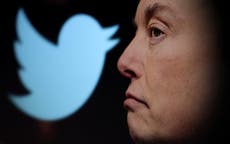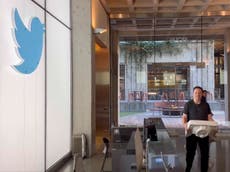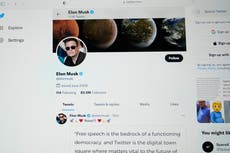Elon Musk has ensured the Twitter blue check is a sign of who to avoid
I definitely won’t be paying $8 a month to keep mine

Your support helps us to tell the story
From reproductive rights to climate change to Big Tech, The Independent is on the ground when the story is developing. Whether it's investigating the financials of Elon Musk's pro-Trump PAC or producing our latest documentary, 'The A Word', which shines a light on the American women fighting for reproductive rights, we know how important it is to parse out the facts from the messaging.
At such a critical moment in US history, we need reporters on the ground. Your donation allows us to keep sending journalists to speak to both sides of the story.
The Independent is trusted by Americans across the entire political spectrum. And unlike many other quality news outlets, we choose not to lock Americans out of our reporting and analysis with paywalls. We believe quality journalism should be available to everyone, paid for by those who can afford it.
Your support makes all the difference.Apologies if you read my eulogy to Twitter last week and thought I was leaving. I only meant that the medium was dead, not that I was.
But, in the not-quite-week since the Chief Twit has “let that sink in,” a few not-so-nice things have happened on the social platform where I am a currently a verified user. Talking about the vitriol and uptick in hate speech would take longer than this column allows — so I’m here to talk, instead, about Elon Musk’s proposed changes to the current verification policy, which has set the internet ablaze.
Twitter verification, which is denoted by a blue check next to the name of the user’s handle, was launched in 2009, three years after the site itself. The idea of verification was that it could prove the identity of a user (it was initially proposed in response to celebrities who were being trolled by unofficial accounts on Twitter, and who wanted their fan base to know that one singular account was, in fact, them).
Depending on your field, Twitter’s pre-Muskian verification required a few things: that you prove your identity via a state- or country-issued ID; that you prove to Twitter that you were notable in your field (for me, that meant sending in three national newspaper and magazine articles that had been published within the past six months); and that your account was public. There was no fee for this service. The point was simply to protect public-facing users from facing fake doppelgängers in the metaverse.
Of course, the blue check inadvertently became a status symbol. Tweets with blue checks were often promoted, sometimes because accounts with blue checks had larger followings. Somewhere along the way, the idea of “verification as proof of identity” became conflated with “verification as proof of hierarchy.”
That’s when Musk stepped in with an idea to charge for it. He proposed $20 a month for Twitter Blue, an existing program that allows users to bypass ads — and that will now allow anyone at all to purchase a blue check. (After going back and forth with Stephen King on the site, Musk agreed to lower the price to $8 a month.)
The catch is that existing verified users will lose verification if they fail to subscribe to the paid $8-per-month service within the next 90 days.
Most existing verified users, of course, will not pay. Stephen King won’t be verified anymore. The Washington Post? Unchecked. Representative Alexandria Ocasio-Cortez already trolled Musk, hard, about his extremely bad idea (she’s not buying it.) This journalist will be bowing out. I can’t imagine that former president Barack Obama, with his 133 million followers, really needs to pay Elon Musk $96 a year for a platform. None of us need Twitter as much as Twitter needs us, it turns out. What will remain when we leave? A graveyard of anonymous blue checks. Nobodies with elevated status. A state of elevated importance for everyone, Elon cries!
Eh, not so fast. The most interesting thing about the blue check, once the 90-day trial has expired, is what it will tell us about human nature. We will know, from looking around at our peers, that every blue check will denote a pay-for-play scenario. Where a check once meant that a person was public-facing — a journalist, a politician, an actor, a philanthropist, a trusted news source — now we will know something else.
We will know, for instance, that the wearer of the blue check is someone who wants his, her, or their money to go to someone who tweets conspiracy theories about the husband of the Speaker of the House, an 82-year-old man who was just mercilessly beaten in his own home with a hammer. That person with a blue check? Just some loser who thinks that it’s cooler to spend $44 billion on a website than on solving world hunger.
Twitter will be different, a sea of verified trolls. Every single person who has a blue badge will have paid for one. A blue badge will denote a certain set of values, Elon’s mission, the worst parts of humanity.
Elon Musk will have exposed his own trolls, and I can choose not to engage with anyone with a blue check. See a blue check? No thanks. BLOCKED. In this way, Elon Musk has, yes, brilliantly, dismantled the verification system, outing Twitter’s worst personalities. It may not be what he intended, but it will certainly make it easier on the rest of us, because we can choose not to interact with any of these garbage people.
I like the idea of knowing the political identity of my adversaries without having to ask. Thank you, Elon, for making this so very clear. The blue checks will be Trump’s red hats, in avatar form, another way of offering up to those of us who still care the purest form of what we aspire not to be. Take my trash verification badge. I’d pay far more than $8 a month for a Twitter that weeded out the racists and the antisemites. That would be money well spent, badge or not.




Join our commenting forum
Join thought-provoking conversations, follow other Independent readers and see their replies
Comments